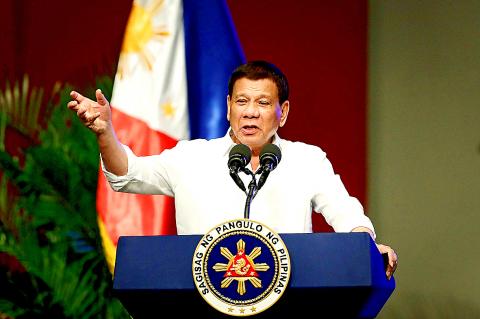The Taiwan-based Bamboo Union and Hong Kong-based 14K triad are behind the proliferation of drugs in the Philippines, Philippine President Rodrigo Duterte said yesterday, after barrels of drugs fitted with satellite positioning equipment and covered with Chinese writing washed up in the Philippines on Wednesday last week.
He first made the allegation that the drugs were from Taiwan while speaking at a police academy alumni event on Thursday last week.
Duterte, speaking on Tuesday at an event marking the 120th anniversary of the establishment of the Philippine Department of Justice, named the Bamboo Union and 14K as running the drug trade in the country.

Photo: EPA
At an event celebrating the 56th anniversary of the Philippine Constitution Association, he said that the Philippines is a client state of the Bamboo Union.
“The Philippines is a transshipment [point] of shabu to America. It behooves upon America to work closely with the Republic of the Philippines, especially in this serious matter,” he said.
Shabu is a slang term for methamphetamine that is widely used in the Philippines, Japan, Hong Kong, Malaysia and Indonesia.
Illegal drugs have penetrated 40 percent of the villages in the country, Duterte said.
He has been pushing to postpone village elections scheduled for next month, citing the alleged presence of narcotics in politics at the village level.
Duterte, who is known for his controversial policy of cracking down on drugs by sanctioning extrajudicial killings of suspected drug dealers, on Thursday last week reportedly gave police orders to kill his eldest son if they discover that he is involved in the drug trade.
That remark came after Philippine Senator Antonio Trillanes claimed that Duterte’s eldest son is a member of a Chinese drug triad.
Meanwhile, a Ministry of Foreign Affairs spokeswoman yesterday reiterated Taiwan’s support of the Philippine government’s “war on drugs.”
Regarding Duterte’s claim that the Bamboo Union, a known organized crime group, is one of the primary sources of drugs in the Philippines, ministry spokeswoman Eleanor Wang (王珮玲) said in a statement that the government would work with relevant Philippine agencies to eliminate cross-border drug-related crime.
A critical component of the administration’s New Southbound Policy is to strengthen Taiwan’s collaboration with other nations to crack down on international crime, which in the case of the Philippines means a shared effort to combat drug-related crime, Wang said.
The statement did not dispute Duterte’s allegations, but voiced support for his increasingly tough policies on drug-related activities.
The Taipei Economic and Cultural Office in the Philippines yesterday rejected Duterte’s claims.
Representative to the Philippines Gary Lin (林松煥) said that what is known at the moment is that illegal drugs in the Philippines are not coming from Taiwan.
Taiwan does not ship drugs to the Philippines, Lin said, but added that his office was looking into the situation.
Regarding an allegation that drugs were being produced in labs in international waters, Lin said that Taiwanese fishing boats were not involved and that the transportation routes were most likely in international waters.
Raw materials for the production of illegal drugs have been mainly obtained from China, while Taiwanese have provided expertise, said a Philippine source, who claimed to be an expert on the Philippine drug trade.

Chinese Nationalist Party (KMT) Chairman Eric Chu (朱立倫), spokeswoman Yang Chih-yu (楊智伃) and Legislator Hsieh Lung-chieh (謝龍介) would be summoned by police for questioning for leading an illegal assembly on Thursday evening last week, Minister of the Interior Liu Shyh-fang (劉世芳) said today. The three KMT officials led an assembly outside the Taipei City Prosecutors’ Office, a restricted area where public assembly is not allowed, protesting the questioning of several KMT staff and searches of KMT headquarters and offices in a recall petition forgery case. Chu, Yang and Hsieh are all suspected of contravening the Assembly and Parade Act (集會遊行法) by holding

PRAISE: Japanese visitor Takashi Kubota said the Taiwanese temple architecture images showcased in the AI Art Gallery were the most impressive displays he saw Taiwan does not have an official pavilion at the World Expo in Osaka, Japan, because of its diplomatic predicament, but the government-backed Tech World pavilion is drawing interest with its unique recreations of works by Taiwanese artists. The pavilion features an artificial intelligence (AI)-based art gallery showcasing works of famous Taiwanese artists from the Japanese colonial period using innovative technologies. Among its main simulated displays are Eastern gouache paintings by Chen Chin (陳進), Lin Yu-shan (林玉山) and Kuo Hsueh-hu (郭雪湖), who were the three young Taiwanese painters selected for the East Asian Painting exhibition in 1927. Gouache is a water-based

Taiwan would welcome the return of Honduras as a diplomatic ally if its next president decides to make such a move, Minister of Foreign Affairs Lin Chia-lung (林佳龍) said yesterday. “Of course, we would welcome Honduras if they want to restore diplomatic ties with Taiwan after their elections,” Lin said at a meeting of the legislature’s Foreign Affairs and National Defense Committee, when asked to comment on statements made by two of the three Honduran presidential candidates during the presidential campaign in the Central American country. Taiwan is paying close attention to the region as a whole in the wake of a

OFF-TARGET: More than 30,000 participants were expected to take part in the Games next month, but only 6,550 foreign and 19,400 Taiwanese athletes have registered Taipei city councilors yesterday blasted the organizers of next month’s World Masters Games over sudden timetable and venue changes, which they said have caused thousands of participants to back out of the international sporting event, among other organizational issues. They also cited visa delays and political interference by China as reasons many foreign athletes are requesting refunds for the event, to be held from May 17 to 30. Jointly organized by the Taipei and New Taipei City governments, the games have been rocked by numerous controversies since preparations began in 2020. Taipei City Councilor Lin Yen-feng (林延鳳) said yesterday that new measures by